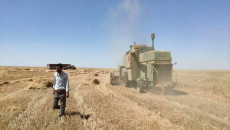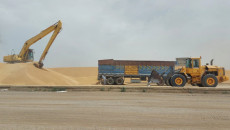The second phase of wheat payments will arrive in the next 10 days as the Iraqi government has decided to directly pay framers for the crops they deliver to state silos, wheat and barley in particular, a ocal official of Kirkuk affirmed, while payments for last years have not been covered yet.
"The financial entitlements of all the farmers who have handed over their wheat to the government are ready,” said Zuhair Ali, director of the Kirkuk Agriculture Department. According to the government's decision, all the financial entitlements of the farmers must be paid by June 31," Ali told KirkukNow.
According to the agricultural statistics of Kirkuk, 164,000 tons of wheat has been received from farmers in Kirkuk province through the three silos of (Daquq, Riyadh and Taza) as the process continues.
This year's agricultural plan was to plant 1.5 million acres of land for both wheat and barley, "but 450,000 dunams went out of the agricultural plan due to lack of rainfall, the other 600,000 dunams relied on well water and irrigation projects," he added.
The Iraqi Ministry of Commerce has paid 850,000 dinars per ton of wheat to farmers this year. The immediate state budget comes at a time that Russian invasion of Ukraine has spiked international demand on wheat and barley due to the gap created by restriction on export of crops by Ukraine, Europe’s basket food, to its clients worldwide.
Kirkuk, center of the disputed territories between Baghdad and Erbil has 1.5 billion square meters of agricultural farmlands, out of which 0.9 billion is allocated for wheat, 2020 statistics of directorate of Kirkuk agriculture show.
Absence of state support and poor rainfall has sharply dropped down production of crops. Kirkuk meteorology said total rain in 2021 was only 104mm compared to 283mm in 2020 and 535mm in 2019, as desertification looms over the unknown destiny of Iraq and other countries in the region.
This year's production is not yet fully revealed, but last year was close to 500,000 tons, while in 2020 wheat production will exceed 600,000 tons, Kirkuk agriculture director said.
The Iraqi farmers depend on the state in the production of grains, a policy criticized by experts as for years as grains were stored in silos in vain and funds not allocated to pay farmers delivered their crop to state silos.
The Ministry of Trade stores or buys produce from farmers and distributes it to mills in order to provide state-subsidized food rations and subsidized floor into markets as bread and rice make the main dish of the Iraqi cuisine.
The Agriculture Ministry supports farmers by providing harvesting tools, seeds, fertilizers and pesticides at a subsidized rate or for free while farms call for direct involvement of the state following scarcity of water, frequent waves of dust storms and unaffordable cost of other necessities.






